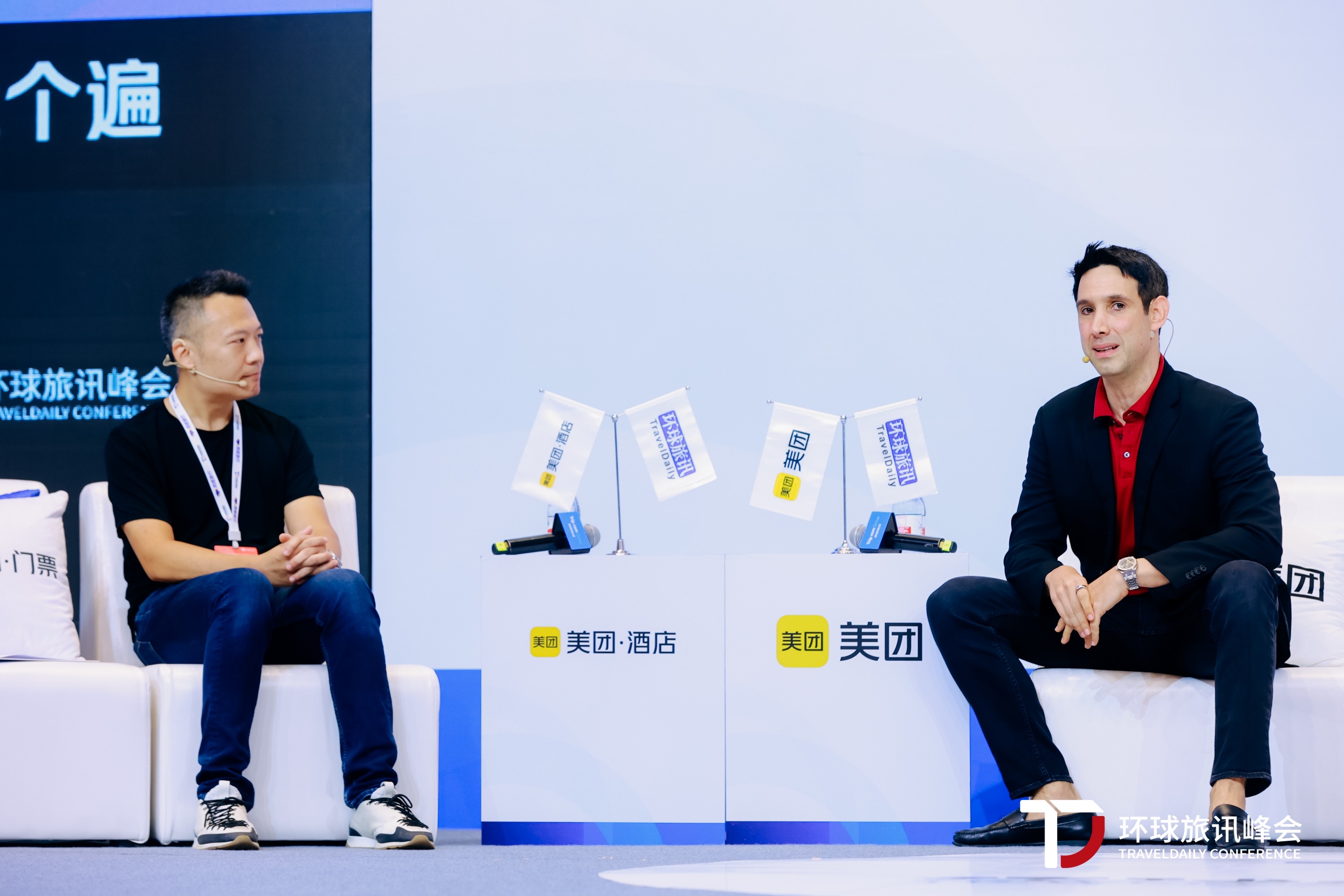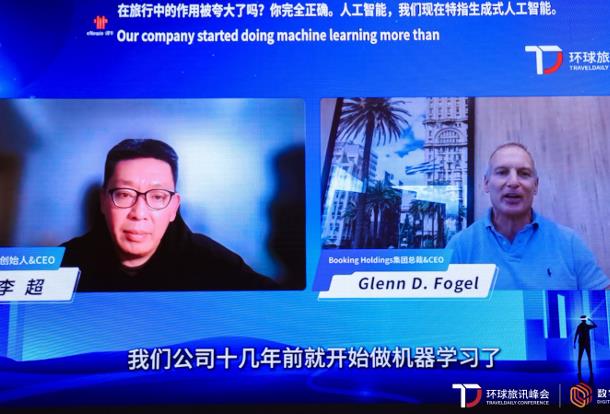With the widespread of generative AI, a lot of tools have been used to enhance operational efficiency, particularly in customer service, content generation, and software development. In the travel industry, AI is used in various stages of the customer journey, but the percentage of customers interacting with it is still small. It’s believed that it still takes time for customers to learn to trust the machine.
In an Executive Talk session, Omri Morgenshtern, CEO of Agoda, shared his views with Lio Chen, a consultant at RationalAI, about the role of AI in driving online travel at the 2023 TravelDaily Conference in China on September 7 at the 2022 TravelDaily Conference in China.

Left: Lio Chen, Consultant at RationalAI
Right: Omri Morgenshtern, CEO of Agoda
Discussing Agoda’s strategy for China, Morgenshtern revealed that the company is focusing on both inbound and outbound travel. He noted that top destinations for Chinese visitors include Agoda’s core markets such as Hong Kong, Thailand and Singapore. “We are very strong,” he stated, refering to Agoda's competitive edge in these markets.
On the topic of outbound travel, Morgenshtern acknowledged the presence of larger companies in China that understand the Chinese customer better. As part of Agoda’s strategy, the company aims to empower these companies through B2B partnerships. “Our goal is to work with everybody in China and leverage our expertise in international travel,” he explained.
Following are excerpts of the taik:
Lio: I think we have to talk about ChatGPT today. From your side, you guys have been looking to generative AI for quite some time. In the early morning of today's (Sept. 7) session, I think you've heard people from Fliggy and Ctrip talking about their vision. From Fliggy’s perspective, they said AI first. And from Ctrip's perspective, they're taking a hybrid approach, feeding the large language model with some sort of a verified list of recommendations. In your opinion, based on your actions, how do you leverage generative AI to enhance your product and offerings?
Omri: I think AI is still relatively high in the hype cycle. I think there are two big use cases the way I look at it. One of them is the consumer interface. When most people talk about generative AI, they talk about how it interacts with consumers.
The other use case is what I'll call operations efficiency. I see a huge disruption happening today on the operational and efficiency side, things like customer service, content generation and software development. These are the areas that we see efficiencies coming from smart usage of generative AI.
And I suspect that the way for anybody that played with Copilot as a tool for development will tell you that developers 5 years from now or even today are working very, very differently than what they worked 6 months or a year ago, which is fascinating. So in that angle, I think we are all in. We definitely wanna change and gain this efficiency as fast as possible. That immediately gets translated to velocity, experiments, features.
On the consumer interface side, the jury is still out there. I know that everybody would want to see all the interfaces changing to a chat type of things. And ChatGPT is a very good proof of concept. I think the challenge there is more about the customer education.
I think we all use AI in different pieces of the funnel, allowing our customers to interact with it. If you look at what percentage of the customers are actually interacting with it, it's very, very small.
And growing that over time is going to be tricky. I think the key element for that should be trust. And it's very hard to get trust with problems like hallucinations. And so people need to learn over time to trust the machine, which I think will take a long time.
And even if they do that, there's a question about the user interface. On the one hand, you have user interface is like doing it right where you swipe, swipe, swipe, click. On the other hand, you need to chat a lot and read a lot. I think that there is something about Gen Z and something about clicking and the simplicity of the interfaces that doesn't sit well with this chat. So somewhere in between it emerges. And I think it's a long journey together. But I don't think the challenge is the model. I think the challenge is the customer education to the interface.
Lio: Since you mentioned Gen Z, I kind of have to ask you about trends and opportunities. What are some of the key trends you see and how do you make sure Agoda stay ahead of the curve?
Omri: I think one of the key trends that we’ve seen during Covid and coming out of Covid is how important flexibility has became. If you look at Agoda at the mixture of rooms that are refundable versus rooms that are non-refundable that we sell, non-refundable tends to be cheaper. Before the Covid, you would see those numbers to be roughly 50-50. After Covid or during Covid, it was almost 90% refundable and 10% non-refundable, because people didn't know if something will close, when the airport will be open. And what’s interesting is that coming out of Covid, it didn’t go back to 50-50. It’s still around 80-20, which means that people value flexibility, the ability to cancel, the ability to change plans. People weigh more in flexibility.
And one of the very interesting things that emerged is what we call “Consumer FinTech”. This entire notion is about how you take a non-refundable offer, take the risk on yourself and make it refundable for the customer. And if you are a big company, then there is a chance that you can resell the room, even if the customer cancels it. Sometimes you need to charge for it. Sometimes you don’t even need to charge for it. Things like “Cancel For Any Reason”, especially on flight tickets, are now refundable, enabling people to cancel flights.
Again. You take risk because you need to be able to resell. This entire award of credit risk between refundable and non-refundable is, I think, relatively new, and is exploding worldwide. I should say, it is a huge opportunity for many brands, including us, to differentiate ourselves.
Lio: I'm not surprised, but also kind of surprised that you did not mention super app being one of the trends. I know historically, you’re being skeptical about super apps’ growth outside China. But at the same time, I realized there are a couple of leaders in Southeast Asia that are quite bullish on the concept. Would you mind revisit that topic?
Omri: A few things. First of all, we have a super app outside of China. It’s called Google. It's pretty good. First, there is a matter of definitions. I think there is a difference between a travel platform and a supper app. I do believe that travel platforms, which is related to what we call “Connected Trip”, they need to supply the services of a traveler. From the moment you step out of your home to the moment you step back in, everything you want to buy, we need to be able to supply, right? Even earlier than you step out and when you plan, right? But that’s not super app for me.
I think there is very little value with us selling food delivery as a travel player. There is relatively little value with us doing eCommerce. It’s not that we cannot do it. I think it’s just the difference between trying to attach this to our customer base versus just creating a new brand is not that material. And I think even companies try to have more frequency and said, “Oh, we can attach other products,” it's pretty hard. It's not easy.
But in China, it worked for the likes of Meituan and WeChat and others. I think the ecosystem in China evolved in a way that people had to find many things that, for customer outside of China, they just do with the search engine. Here are more complicated and people are picking apps to do things for them. And that, I think, drove that. But that doesn't exist outside. That’s one of the reasons that I’m skeptical. I think it’s not very economical. And I think the ecosystem, the consumer minds, is not the same consumer mind.
Lio: Got you. Let’s zoom in onto China. In the past few years, there have been strategic partnerships formed between Agoda and Alipay+ and Fliggy. Over the last few years, particularly in the context of Covid, consumer behavior evolved in inbound and outbound travel. The landscape is changing drastically. How would you like to strengthen that partnership? Or what is your strategy for China from this point forward? Are you more of the inbound fan, or outbound fan?
Omri: I don't think inbound and outbound tend to be very different efforts. They don’t overlap almost completely. And as a result, we're both. When it comes to inbound, if you look at the markets that people travel from China, there is a lot of them. Top destinations for Chinese visitors include all our core markets – Hong Kong, Thailand, Japan, South Korea, Vietnam, Singapore, Taiwan and the Philippines.We are very strong. So there’s no reason why when it comes to inbound, we want to be a very, very, very strong player in the ecosystem.
When it comes to outbound, we have a good presence. But there are a lot of bigger companies out there in China that know the Chinese customer better. So part of our strategy has to be to empower them, which is B2B. And by the way, Alipay+ is more of an outside-of-China brand, not so much a China brand. But Fliggy and Meituan and other partners in the trip group, we work with all of them.
We are also a B2B provider. Our goal is to work with everybody in China and leverage our expertise in international travel. We know all the hotels, vacation rentals, they are all on our platform. Our goal is to be able to provide interfaces and tech that works for Chinese providers and our Chinese brands, and at the same time provide them with what we do best, with the best rate to sell to the Chinese customer. And if we do that, then I believe this works. I would say on the outbound front, it’s a mixture of B2C and B2B. And I think the importance of B2B is tremendous.
Lio: Sounds good. Let’s move back to the B2C part of your business. Given your extensive product background, let’s do a deep dive into the evolution of Agoda. I think Agoda started with a platform that offers hotels and very quickly added flights and private stays. And then during Covid, you add a couple of more things. And if I were to log on to Agoda.com today, I get to see things like longer stays, deals and coupons, etc. It seems like a pretty complete OTA, minus packages and loyalty. How do you prioritize a million of these things from this moment forward?
Omri: We do sell activities. It's actually growing very, very fast. It’s surprising how fast it grows. So we do sell activities, packages, and we do have loyalty. It's called the “Agoda VIP” and it's very similar to the loyalty of other platforms.
Before I explain why I think it's important, I think where we go is this concept of travel platform. This is not a super app. This is a travel platform. And what it means is that as customers wanna be able to get all the services from one platform, it’s much more convenient from a customer service support. If you book on one platform, and then you have changing plans, one customer support changes all of your plans for you. Plus, usually if you book with the same platform, it means that the rates can be cheaper. The package can be cheaper.
We can sell dynamic packages. The problem is that for dynamic packages, people need to book everything at the same time. But most of the customers, they don’t want to book everything at the same time. They book something today, something maybe before they travel, something while they are in the destination. That’s where I think there is a disruption coming.
And the idea is how to create what we call “Persistent Trip”, which means the package is persistent. You keep adding things to your package. And every time you add, it’s much cheaper than buying it separately anywhere else. And if we can do that, it means that customers are starting to buy itinerary rather than buying individual things for us. And I think this is the key. And we’re not the only one pursuing that. I think that's a big race that is happening everywhere in the travel industry.
It’s not only offering the verticals. It is how you put them together and educate the customers that the more they bundle in, the cheaper it becomes and the easier it becomes from a support perspective. Right? Now, how do you prioritize? It’s not that difficult in the sense that we experiment a lot. So we will put it in the funnel, and when you click on a button, it tells you to be billed later.
And then we see where the interest of the customers is. We do surveys to understand where is the majority of the of the manual transactions of our customers when they travel that we don’t fulfill. And then we just go down that list. The trick is that if you try to do too much at the same time, you usually fail. So you gotta know what your resources are and how you gradually build the next step. For us, that's the trick. But I have to tell you, it’s going very well for us.




